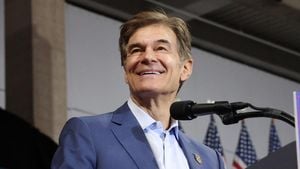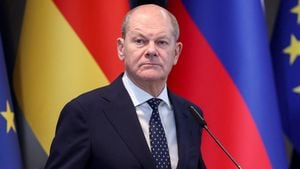President-elect Donald Trump prepares to reshape his administration with significant influence from Project 2025, a comprehensive conservative policy agenda developed by the Heritage Foundation. Despite Trump's previous assertions distancing himself from the initiative, various architects of this plan are now slated for key roles within his upcoming administration, hinting at a notable shift from his campaign rhetoric.
Project 2025, described as encompassing around 900 pages of policy recommendations, serves as both groundwork and playbook for Trump’s anticipated strategies if he takes office again. Leading figures from this initiative, including Russell Vought, a former Trump administration official, are reportedly being considered for high-level positions. Vought, who played a pivotal role in drafting the project, authored the chapter focusing on the Executive Office of the President, which is now under scrutiny as he becomes increasingly popular among Trump's inner circle.
Vought's anticipated return draws attention for multiple reasons. His involvement with Project 2025 is well-documented, and sources indicate he has begun the vetting process for either his old role as the Director of the Office of Management and Budget or another influential post focusing on economic policy. Recently, he has been spotted at Trump's Mar-a-Lago estate, engaging with the former president's close advisers. The juxtaposition between Trump's campaign claims of ignorance about Project 2025 and his current hiring practices raises eyebrows among political observers.
During the campaign, Trump claimed he had "nothing to do" with the plan and sought to distance himself from its controversial proposals. His transition team, particularly co-chair Howard Lutnick, labeled the project "radioactive," indicating potential backlash against candidates associated with it. Nonetheless, the administration's recent appointments suggest otherwise, indicating Trump's willingness to embrace the very strategies he once distanced himself from.
Other Project 2025 contributors are also gaining traction within Trump's roster of administration picks. Gene Hamilton, who authored the chapter on overhauling the Department of Justice, is reportedly under consideration for a significant legal position, with his skeptical views on the Department’s direction under previous administrations aligning closely with Trump's agenda. Meanwhile, Brendan Carr, another key figure and FCC commissioner, has been nominated to take charge of the Federal Communications Commission, often spewing directives concerning significant technology companies and their regulation.
Carr's chapter within Project 2025 discusses ambitious plans to alter how the federal government interacts with tech giants, outlining proposals to diminish their influence. Specifically, Carr advocates for restricting the liability shield provided to these companies under Section 230 of the Communications Decency Act. This action would lead to substantial changes across social media platforms, pushing for increased accountability and transparency from tech businesses.
Interestingly, Carr's ties with Elon Musk, whose companies could stand to benefit from federal regulations, have sparked debates among Trump's advisers, many of whom express concerns about Musk's growing sway within the administration. Carr's recommendations also highlight potential security threats posed by Chinese businesses—such as TikTok—which he claims need stringent oversight.
Concerns about the feasibility of Carr's policies loom large as well—especially considering the current Democratic majority at the FCC until mid-2025 makes swift implementation of his agenda challenging.
Similarly, Tom Homan, another Project 2025 contributor, has been identified as Trump's future "border czar." Having previously served as acting director of ICE, he will likely drive Trump's immigration policies, which are central to the administration's agenda. Homan’s focus aligns closely with Project 2025's vision of transforming the U.S. immigration system through broadened executive powers, rapid deportations, and reducing protective programs put in place by opposing administrations.
Despite Trump’s previous comments aiming to deny any connection to Project 2025, this pattern of nominating key authors offers insight toward what could be the early actions of his potential administration. By accommodating individuals allied with Project 2025's controversial plans, Trump could aim for aggressive policy shifts reflecting radical conservative ideals.
Among the more extreme proposals outlined by Project 2025 is the elimination of several federal agencies, such as the Department of Education, and implementing sweeping reforms to combat the perceived threats from left-leaning influences on federal agencies. The movement indicates Trump's interest to not only govern but do so with ideological fervor.
The potential for Trump to formally adopt these radical policies raises questions as to what the American political and social landscapes could look like should he regain leadership. With names like Carr and Homan likely to oversee major federal departments, it is evident those connected with Project 2025 are set to significantly influence the future direction of American governance.
Democrats have labeled Trump's connection to Project 2025 as evidence of the developing radicalization of the Republican party. Their focus during the election was the apprehension surrounding Project 2025, which goes beyond traditional conservative agendas, exhibiting far-right priorities and strategies potentially destabilizing to both domestic and foreign policies. The proposal marks not just intent, but detailed actionable items aimed at consolidative power within the presidency and decreasing federal bureaucracy.
This moment did not go unnoticed by Republicans who've already shown mixed feelings toward Project 2025 on the campaign trail. Nonetheless, Trump's willingness to engage with Project 2025 could stir foundational changes reminiscent of his previous tenure. It remains to be seen how these proposed initiatives will manifest within practical governance should Trump fulfill his return to office.
Looking forward, there is significant speculation about Trump's potential for using Project 2025 as the backbone of not just his administration’s policies but as guiding principles moving beyond the initial 180 days should he reclaim the presidency. With the former president's track record indicating his likelihood of following through on such commitments, these developments warrant close scrutiny from all corners of the political spectrum.



